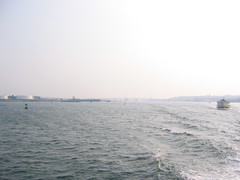Scenic Coast, Toxic Air
Mercifully, a cold front finally came through Maine last night and cleared away the humid blanket of polluted air that had been smothering us for most of the week.
On Tuesday, the ozone monitoring station at Two Lights State Park in Cape Elizabeth recorded the season's first violation of federal air quality standards, and on Wednesday, recorded levels of ground-level ozone went even higher, edging into the code-red "unhealthy" zone. We can't blame midwestern power plants for this one: ozone pollution is a local product of our own tailpipes and gas-fired power plants.
Strangely enough, this all happened just a few days after the Bush administration came out with a rare proposal to strengthen pollution regulations: specifically, to reduce acceptable levels of ozone from 80 parts per billion (where we were on Tuesday) to 70 parts per billion. This would have significant ramifications for Maine: Portland is just barely in compliance with the current limits, which are based on a three-year moving average, but the entire Maine coast usually has three or four days a summer when ozone exceeds 70 ppb - and we've already had three of those days so far in 2007, with the summer smog season barely underway.
When the new standards take effect and we start breaking them, the federal government isn't going to send in agents to arrest O3 molecules. Instead, they'll place restrictions on Maine industries, reduce our share of highway funding, and force gas stations to sell more expensive, cleaner-burning varieties of gasoline. This will improve air quality, in theory, but it will also put a substantial ball and chain on the Maine economy.
What's the Maine Turnpike Authority, which oversees our state's largest single source of air pollution, doing to help Maine avoid this unpleasant situation? Well, those traffic engineers are in estrus over plans lay down an expanded six-lane freeway just upwind of us, but they can't be bothered to build a sidewalk around the edge of their new Portland headquarters building. But that rich topic deserves an entire post of its own.





No comments:
Post a Comment